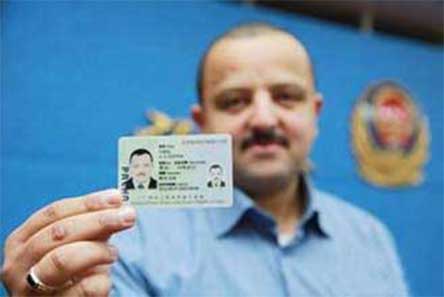Last year the government made big changes for granting foreigner visas for China. The new foreigner visa grading system will classify you as either an A, B or C-listed foreigner. Your grade will affect your legal status living and working in the country.
At one time China’s borders were relatively open, attracting a lot of bad apples, as reported in this eChinacities article. However, China has since made great strides to regulate who gets the “privilege” to reside in the Middle Kingdom.
There is an estimated 200,000 - 2 million illegal aliens living in China that the government would apparently like to sweep out. Instead of building a wall like US President Donald Trump suggested to curb illegal immigration from Mexico, however, China has opted for an ABC grading system. Phew!
So let’s push all political correctness aside for a second and find out: How valuable of a foreigner are you?

ID Cards
The first part of the plan is to give foreigners ID cards, just like the Chinese. You’ll no longer have to bring your passport everywhere you go, not that anyone really does that anyway. Instead you’ll just need a plastic card that fits easily into your purse or wallet. Along with your photo, your ID card will also sport a unique number and your A, B or C ranking (see below for more details on that).
On one hand, the pros are obvious. Having an ID card will make your life much easier when purchasing things like train tickets or checking into a hotel. China has also extended its e-channel border crossing service to foreigners with ID cards, showing a willingness to further integrate expats into society.
On the other hand, there is one big con. A cynic could suggest that main reason the government is so kindly giving IDs to foreigners is to better track their every step. And, of course, don’t be surprised if fines or other consequences arise for those not carrying their IDs when pulled over for a random police inspection.
Grading System
In first-tier cities, the foreigner visa grading system is already in place. For those living elsewhere, it should be implemented by mid-2017. From that point on, just like celebrities, all foreigners will be classified as A, B or C-listed. A point system will determine your ranking. Though the government hasn’t officially stated what factors are used in the ranking criteria, the Beijinger and the New York Times both speculated on the system.
Based off their info along with our own assessment at eChinacities, this is how the rankings will work:
Salary (RMB per month) | 0 to 10,000 | 6 points |
10,000 to 30,000 | 12 points | |
30,000+ | 16 points | |
Education | Masters, MBA, PhD, etc. | 5 points |
Degree from low ranked university | 6 points | |
Degree from world top-200 ranked university | 12 points | |
Degree from world top 50-ranked university | 16 points | |
Years of work experience in China | 0 to 2 years | 6 points |
2 to 5 years | 12 points | |
5+ years | 16 points | |
Chinese language fluency | HSK I or below | 6 points |
HSK V to VI | 16 points | |
HSK II to IV | 12 points | |
Age | Under 25 or over 60 | 6 points |
25 to 45 | 16 points | |
46 to 60 | 12 points | |
Residency | First-tier cities | 6 points |
Second-tier cities | 12 points | |
Third and fourth-tier cities/rural areas | 16 points | |
0 to 60 points Grade C; 60 to 85 points Grade B; 85+ points Grade A | ||
Why are they doing this?
The same New York Times article stated that: “Class A will include top professionals, [along with] innovative and creative talent... Class B will include other professionals who fit with China’s economic development plans and could fill short-term gaps, especially in management and technical areas… There will be limits in international trade, sports, culture and education. Class C will include unskilled or service industry workers. These should be strictly limited.”
In short, the government is looking to attract more professional foreign talent while simultaneously limiting the amount of lower-skilled foreigners entering the country.
What can I do to improve?
If you’re worried about where you rank and whether it will affect your long-term plans in China, here are some tips on how you can increase your grade:
• You may be able to use the salary ranges to get a raise from your boss. For example, if you’re making RMB 29,000 per month, present the facts to your boss to let him/her know that adding an extra grand to your salary each month could be enough to secure your presence in the country. Hey, it’s a long shot, but give it a try.
• If you need an extra 5 points, consider doing a Masters or getting an MBA while living in China. Check out this eChinacities article on best universities for foreigners in China.
• Brush up on your Mandarin. HSK II is very basic, as you only need a vocabulary of 300 words and a few simple grammar points. Just a few months of studying should be enough to raise you from level I to II (adding six points to your score). Making the transition from HSK IV (1,200 word vocab) to V (2,500 word vocab) is a bit harder, but doing so will add another four points to your mark.
| Hot New Jobs recommended for you |
|---|

Sino-Global Education Development Foundation
|

Beijing No.35 High School
|

Elan School
|

Lesso&epco
|

Longitude International Education
|

Kid Castle Education Group
|

Maple Leaf Educational Systems
|

Springfield Kindergarten
|

Victory English Training Center
|

Shanghai Speed Snail English Training Centre
|
| View More Jobs |
Warning:The use of any news and articles published on eChinacities.com without written permission from eChinacities.com constitutes copyright infringement, and legal action can be taken.
Keywords: foreigner visa china China visa grading
All comments are subject to moderation by eChinacities.com staff. Because we wish to encourage healthy and productive dialogue we ask that all comments remain polite, free of profanity or name calling, and relevant to the original post and subsequent discussion. Comments will not be deleted because of the viewpoints they express, only if the mode of expression itself is inappropriate.
Please login to add a comment. Click here to login immediately.
It would help newbies doing visa related searches if article titles mentioned specifically whether they are referring to Work, Business, Marriage or Tourist related visas.
Jan 21, 2018 04:20 Report Abuse
the most important question here is, does the id have a chip. if not then its not very useful
Jan 14, 2018 13:34 Report Abuse
It is all hype. Those of us here legally have been given work permit cards. As a previous poster said, they merely prove our ability to work legally. Our ID is based upon our visa and resident permit in our passport. The work permit cards have no functional use of ID whatsoever.
Dec 07, 2017 08:50 Report Abuse
This ID card means the new system of Work Permit? I didn't get the ID Card but new Work Permit ID instead. And my Work Permit can't be used to buy train tickets!!!
Dec 05, 2017 15:58 Report Abuse
This article is actually a repost from January this year, and back then there were plenty of rumors about this new system. The work permit card is not an ID; all it does it prove that you are allowed to work in China. Your ID will still be your passport and corresponding visa or residence permit. Anything else is just hearsay.
Dec 05, 2017 20:11 Report Abuse